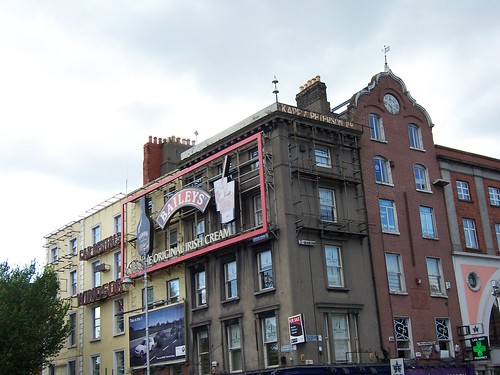I have spent the past week in Dublin. Well, I say Dublin but the working farm on which we stayed was more specifically located about thirty miles out of the city in a rural district called Kiltale. Oddly enough we stayed in the loftspace of a converted farm building. That’s how bohemian I am, folks. I spend all of my regular city hours living in an attic only to stay in another attic when I go on holiday. I can’t live in normal houses. Being three floors up in a space originally designed for the storage of timber is the only way I can sleep.
There was of course a difference of view. In Glasgow the view from my window is of Hyndland’s crumbling townscape. In Kiltale the view was this:

Dublin was great. It had a far more European feeling than I had anticipated. Yeah, I know the Republic of Ireland is a proper part of Europe and everything but in my mind’s eye Dublin was going to be a fairly British-feeling city and I did not believe that the tiny plane journey from Glasgow (barely a takeoff and a landing than any kind of ‘flight’) would qualify this as a real trip ‘abroad’. But in fact Dublin does have that wonderfully disorientating foreign feeling to it.
Having said this, it also feels in some ways like a parallel universe version of London: one that you might see on that old sci-fi show, Sliders or in a Philip K. Dick novel. There is the same sense of ‘bigness’ that London has plus a common lingo, yet everything has a deliberately Irish flavour. The postboxes, for example, are the exact same style as our UK ones except that they are green! Since our red postboxes are so iconic that’s a pretty substantial inversion (just like, I may venture, on the episode of the aforementioned Sliders in which the Golden Gate Bridge was blue). As documented by Dickon Edwards recently, the pedestrian crossings of Dublin are far more lovely than ours in Britain. Where ours leave the pedestrian anxiously awaiting his turn, these ones give him priority. While ours make a squealing ‘hurry or die!’ racket, the ones in Dublin me a far more friendly ‘pukk pukka’ noise akin to Pacman gobbling ghosts. Much better.
While Glasgow’s statuary is of the likes of Donald Dewar; Dublin has a large number of immortalised Bishops. And writers, of course. One of the first statues I recognised was of James Joyce. Dublin is a city that idolises its writers (again, much like in an episode of Sliders in which intellectuals are given celebrity status rather than sportsmen or models). I read somewhere that writers don’t have to pay income tax here.
I’ll not bore you much more, dear reader, with what I got up to in Dublin. The Occasional Papers was never intended to be a travelogue. Besides, whenever I go on holiday I seem to do the exact same things as I do at home: sit around in cafes and look at museums and libraries.
The museums of Dublin, like those of Prague, have a highly conservative approach to curatorship. A sign on the wall at the Museum of Natural History informs the visitor that photography is forbidden as are mobile phones. This is a stark contrast to the museums of Glasgow where everything is very hands-on and stuff like photography are encouraged. As a mark of cheeky rebellion, I took a photograph here anyway (see above – it’s a bit wonky because I hurried my taking of it while the security guard wasn’t looking).
Personally, I’m rather old school when it comes to museums. I get annoyed at the happy-clappy “themepark-ization” of the ones here in Glasgow and would rather have a somber, contemplative experience in them than a fun-packed multimedia ‘journey’. When the subject matter in hand is of dinosaur bones and flint axes, the flash animation installations seem a tacky semiotic clash. On the other hand, the spectacularly dull Dublin Writers Museum holds a bronze-looking sculpture of Oscar Wilde’s head, which is half-obscured by a cardboard ‘no photography’ sign: here the administration literally gets in the way of the exhibits and it makes you think that the hands-on approach to curatorship might not be such a bad thing after all. If only someone would develop a happy medium.

